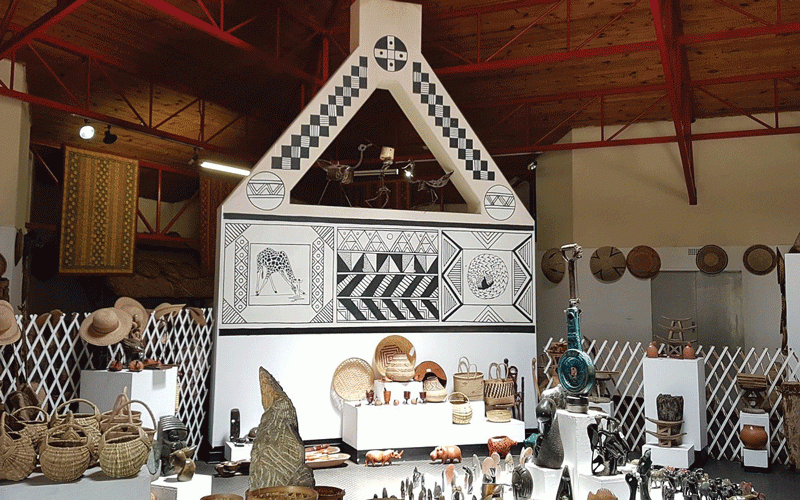
The Covid-19 pandemic may be behind us, but its effects on the arts and crafts industry will be felt for years to come.
The crisis plunged the industry into a crisis, compelling artists and craftspeople to adapt and innovate amidst unprecedented challenges.
Five years later, the sector is still grappling with the covid aftermath, and the struggle to make a living remains evident.
In an in-depth interview with the chairperson of Bulawayo City Council (BCC) Site 7 Arts and Craft Vendors Alison Dube, we explore the ongoing issues faced by art and craft vendors in the post-Covid-19 era.
Additionally, we hear firsthand from two other vendors at the site, each sharing their unique stories and perspectives
Prince Matsika, the former secretary of BCC Site 7 was the first to give his account. He lamented how Covid-19 plunged their business into turmoil and how they have grappled to stay afloat since then.
“Covid-19 brought our business to a standstill. The Covid-19-induced lockdowns resulted in lost sales and income for us as artists, since it barred potential tourists from travelling outside the borders of their countries,” he said.
“We were therefore, thrust into a financial crisis due to lost income and sales. We mostly relied on tourists who would grace our Site and buy different ware but, due to the Covid-19-induced lockdowns, tourist arrivals nosedived sending our business on a downward spiral.”
- Revisiting Majaivana’s last show… ‘We made huge losses’
- Edutainment mix: The nexus of music and cultural identity
- Young entrepreneur dreams big
- Chibuku NeShamwari holds onto ethos of culture
Keep Reading
Matsika added that past Covid-19, business has not picked and they are still struggling to earn a living since the number of tourists has remained low.
“The Covid-19 scare is still fresh and it has kept many tourists away,” he said.
“The situation has been compounded by other problems, for instance, we recently heard about the outbreak of monkey pox in South Africa, an infectious disease caused by the monkey pox virus.
“The media have also made things worse for us because of their negative and sensational potrayal of problems in Africa.
“They have emphasised conflict, poverty and diseases in Africa giving people the perception of a troubled Africa.
“This negative portrayal has deterred people from coming to Africa,”
He added that in the rare circumstances that they get notable tourists plying their stables, it has mostly been through churches like the Celebration Church, The Baptist Church and Latter Day Saints which sometimes promote domestic tourism by bringing tourists to their Site.
Matsika said they import most of the material that they use for production from countries like South Africa.
Another vendor from the Site identified as Tolana lamented the challenge of procuring production materials locally.
She specialises in crotchet art and highlighted that she has to procure crotchet wool from South Africa.
“It is a struggle to procure this crotchet wool locally. I normally get it from South Africa at a higher cost and this pushes the price of the end product up making it go beyond the reach of the local market,” she said.
Tolana also spoke about how efforts to market their art and craft to the international market have failed to materialise because of financial constraints.
“There is absolutely nowhere to take our art and craft. We have consistently failed to partake in exhibitions like the Zimbabwe International Trade Fair (ZITF) because the price charged per stand is beyond our reach,” she said.
“Some time back we gave our craft to certain government ministries l am not at liberty to mention, to market it on our behalf, but they took credit for our work and forgot us.
“We used to market our art and craft at festivals organised by the BCC, but now they are a thing of the past.”
Dube lamented the low numbers of tourist arrivals and competition from other established art and craft shops.
“We have been experiencing extremely low numbers of tourists at our Site,” he said.
“In the post Covid-19 era, most tourists appear to prefer buying art and craft from ‘proper spaces like’ Jairos Jiri Arts and Craft Centre, Mthwakazi Art and Craft or Fazak.
“They no longer pass through Fife Street in big numbers like what used to happen in the past.”
He said they also face competition from unregistered vendors who have mushroomed all over the city selling similar products for a much lesser price.
Dube also spoke about how different initiatives they have tried with the hope to boost their visibility and in turn sales have failed to bear fruit.
He spoke especially about The Japan International Cooperation Agency (JICA) saying it initiated a community based tourism project in Bulawayo a few year ago aimed at sustainable tourism by involving local communities. However, the project encountered significant challenges that Dube was not at liberty to discuss.
The vendors are now pinning their hopes on the Ministry of Small to Medium Enterprises to bail them out of their plight through programs that are aimed at increasing their visibility locally and internationally.










